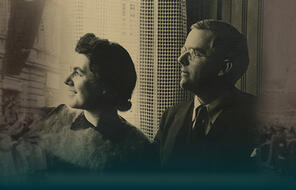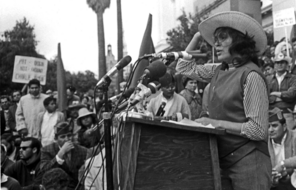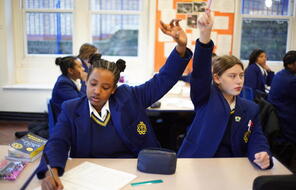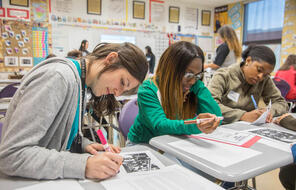Resource Library
Find compelling classroom resources, learn new teaching methods, meet standards, and make a difference in the lives of your students.
We are grateful to The Hammer Family Foundation for supporting the development of our on-demand learning and teaching resources.

Introducing Our US History Curriculum Collection
Draw from this flexible curriculum collection as you plan any middle or high school US history course. Featuring units, C3-style inquiries, and case studies, the collection will help you explore themes of democracy and freedom with your students throughout the year.
3350 Results
Defying the Nazis: The Sharps’ War
These lesson plans use the Ken Burns’ documentary "Defying the Nazis: The Sharps’ War" to explore what motivated Waitstill and Martha Sharp to help refugees.

Being Seen: Becoming Who You Want to Be
Designed for students in grades 7-8, this text set includes lesson plans and multi-genre texts for a two-week unit exploring the essential question “How do we become who we want to be in the world?”

Resources for Civic Education in California
Explore resources that meet the California History–Social Science Framework standards.

Latinx Rights in 1960s California
Explore two pivotal moments in the Latinx rights movement in California: the East LA school walkouts and the first year of the Delano grape strike.

Discussing Contemporary Antisemitism in the Classroom
This unit is designed to help students in the UK reflect on how antisemitism manifests in contemporary society and what needs to be done to challenge it.

Resources for Civic Education in Massachusetts
Explore resources that meet the Massachusetts History and Social Science Framework.

Support for NYC DOE Implicit Bias Workshops
This collection features resources to further equity and justice in New York City public schools.

Developing Student Agency through History and Literature: Middle School Curriculum
Lead middle school students in an 18-week study of identity, membership and belonging, and civic participation through analysis of historical case studies and literature.

Civics for All Resources for NYC Public Schools
This collection features all the Facing History resources recommended in the New York Department of Education’s Civics for All curriculum.

Media and Strategies for Teaching Enrique’s Journey
Find all of the digital resources you need to use the Teaching Enrique's Journey guide.

Materials for Teaching Holocaust and Human Behavior
Explore the collection of media referenced in our unit Teaching Holocaust and Human Behavior, available both online and in print.



